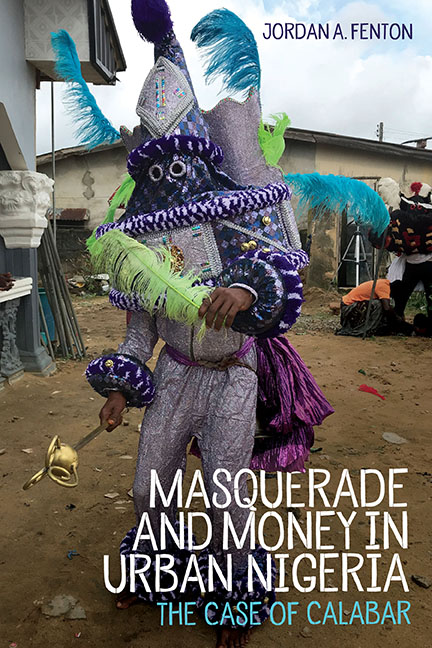Chapter One - Introduction: Masquerade as an Artistic Pulse of the City
Published online by Cambridge University Press: 26 May 2022
Summary
A pivotal moment in my fieldwork came in February of 2010. This was during the third and longest stint of six research trips that I embarked on, in Calabar, Nigeria. At this point, I still thought I was on course to explore the urban dynamics of masquerade from the perspective of a single culture active in Calabar. I was quickly learning that such a topic was incomplete. Although I did not realize it until later, that day I witnessed a performance that crystalized the focus of this book in examining the broader genre of contemporary masquerades active in this city.
On that day, I traveled with the ID Boys to Akwa Ibom, about two hours east of Calabar, to perform the funerary rite for a fallen brother, who was originally from that area. In the days before leaving I was discouraged from going on this trip by many. The ID Boys, like other Agaba factions, is a group composed of marginalized “area boys,” dubbed street hustlers and criminals. Some of my advisers were concerned for my safety since many ID Boys carry guns and machetes and their performances are renowned for violence. I, however, felt very safe with them as an initiated member. In retrospect, had I not been invited and gone, this book would be incomplete.
When we arrived at the hometown of the deceased, junior members went to work. The stage was demarcated as members erected a large, rented canopy. Rented metal chairs were neatly arranged underneath. And, as normal with Agaba members, while setting up, most consumed alcohol and smoked marijuana, some choosing to lace their joints with what is locally referred to as “cocaine.” I recall chatting with an older member and officer of the faction while drinking a room-temperature beer that was quite refreshing on that sweltering day. Archibong Edem said to me, smiling: “You will like what you see today.” He was right; this day was one to remember. Once the space had been established and the men were thoroughly stimulated and ready for action, the funeral ritual finally began.
At the start, all members stood up under the canopy, removed their hats and do-rags, and became silent.
- Type
- Chapter
- Information
- Masquerade and Money in Urban NigeriaThe Case of Calabar, pp. 1 - 31Publisher: Boydell & BrewerPrint publication year: 2022

